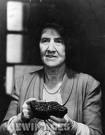Marie Carmichael Stopes 1880 – 1958
January 29, 2009
 Marie
Carmichael Stopes
Sc.D.,
Ph.D. 1880 – 1958 was a Scottish
author, eugenicist, campaigner for women’s rights and pioneer in the
field of family planning.
Marie
Carmichael Stopes
Sc.D.,
Ph.D. 1880 – 1958 was a Scottish
author, eugenicist, campaigner for women’s rights and pioneer in the
field of family planning.
Marie Stopes sought homeopathic treatment for her breast cancer in Bavaria in 1957 (Ruth E. Hall, Passionate crusader: the life of Marie Stopes, (Harcourt Brace Jovanovich, 1977). Page 323).
Marie Stopes was a friend of James Barr, Alfred Bruce Douglas and George Bernard Shaw.
[Stopes attended University College London as a scholarship student studying botany and geology, graduating with a first class B.Sc. in
- After carrying out research at University College London she pursued further study at the University of Munich, receiving a Ph.D. in paleobotany in 1904](http://en.wikipedia.org/wiki/Marie_Stopes).
Following this Stopes earned a D.Sc degree from University College London, becoming the youngest person in Britain to have done so. In 1903 she published a study of the botany of the recently dried up Ebbsfleet River.
In 1907 she went to Japan on a Scientific Mission, spending a year and a half at the Imperial University, Tokyo, exploring for fossil plants. She was also Fellow and sometime Lecturer in Paleobotany at University College London and Lecturer in Palaeobotany at the University of Manchester, in this capacity she became the first female academic on Manchester’s faculty.
Stopes opened the UK’s first family planning clinic, the Mothers’ Clinic at 61, Marlborough Road, Holloway, North London on 17 March
- The clinic offered a free service to married women and also gathered scientific data about contraception.
The opening of the clinic created one of the greatest social impacts of the 20th century and marked the start of a new era in which couples, for the first time, could attempt to take control over their fertility.
In 1925 the Mothers’ Clinic moved to Central London, where it remains to this day.
Stopes and her fellow family planning pioneers around the globe, like Dora Russell, played a major role in breaking down taboos about sex and increasing knowledge, pleasure and improved reproductive health. In 1930 the National Birth Control Council was formed.
Stopes was a prominent campaigner for the implementation of policies inspired by eugenics, then not a discredited science. In her Radiant Motherhood (1920) she called for the “sterilisation of those totally unfit for parenthood (to) be made an immediate possibility, indeed made compulsory.” She also bemoaned the abolition of child labour for the lower classes:
"Crushed by the burden of taxation which they have not the resources to meet and to provide for children also: crushed by the national cost of the too numerous children of those who do not contribute to the public funds by taxation, yet who recklessly bring forth from an inferior stock individuals who are not self supporting, the middle and superior artisan classes have, without perceiving it, come almost to take the position of that ancient slave population."
In 1935 Stopes attended the International Congress for Population Science in Berlin, held under the Nazi regime. She was more than once accused of being anti Semitic by other pioneers of the birth control movement such as Havelock Ellis.
Stopes even cut her son Harry out of her will after he married a near sighted woman - Mary Eyre Wallis, later Mary Stopes Roe, the daughter of the noted engineer Barnes Wallis. Stopes complained that prospective grandchildren might inherit the affliction.
Supporters of Stopes generally concede that she made such remarks, but argue that they should be read in their historical context; such attitudes were not uncommon at the time.
For example, the author Virginia Woolf once wrote in her diary “On the tow path we met and had to pass a long line of imbeciles… They should certainly be killed.”
Following Stopes’ death in 1958, a large part of her personal fortune went to the Eugenics Society.
Marie Stopes was the daughter of Henry Stopes and Charlotte Carmichael Stopes. In 1911 she married Reginald Ruggles Gates; Stopes claimed that this marriage was unconsummated and it was annulled in 1914.
In 1918 she married Humphrey Verdon Roe, brother of Alliott Verdon Roe. Her son, the philosopher Harry Stopes Roe, was born in 1924.
Stopes died from breast cancer at her home in Dorking, Surrey, UK.